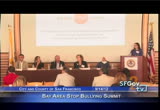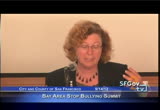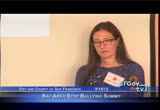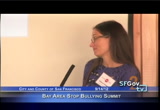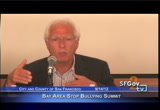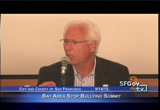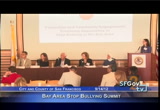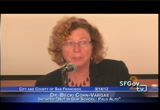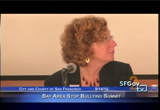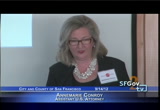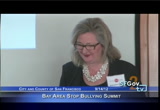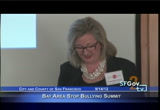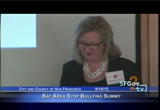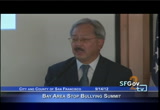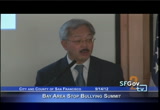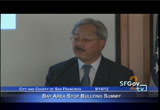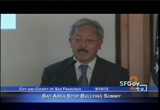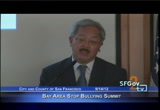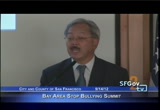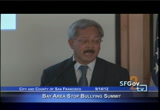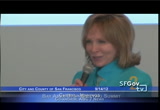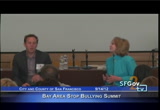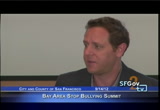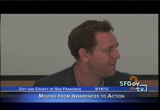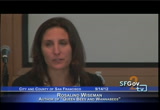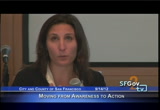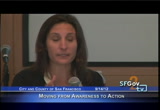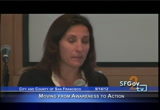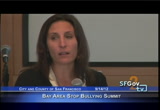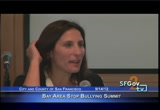tv [untitled] January 21, 2013 3:00pm-3:30pm PST
3:00 pm
responsibility. where is accountability for the schools it play a huge role not only in bullying but also making sure the diversity goes back home. >> really important to have that partnership between home and school. anyone on the panel like to address that? >> there's a term i like to use, it's called identity safety. identify safety means not having your identify taken from you. we think of identify safety on the computers and our credit cards and stuff, but actually if you have to walk in and leave your identity at the door, it's being stolen from you. so identity safety is what we naed to make a priority in our schools. it means getting to know each other's backgrounds, it means valuing each other's backgrounds and getting the parents involved. i think the schools are doing that to different degrees and we have to keep working to build that relationship. ironically i was an english
3:01 pm
language developer and they are calling you to make sure that your children have access to the supports you need, but ironically it comes across backward. anyone who has a second language listed gets checked with to be sure they have the services they need. >> right here. >> so i've been taking notes and one of the things that i run a community center in the western addition and we talk about educating and supporting and one of the things that comes it my mind off the top is really talking to the people that are doing the bullying and understanding hurt people hurt people, right? as we're talking about this, there are two pieces and i'm wondering how do you integrate, we all talk about the finances and making things happen, but one is the mental health piece, the part about understanding where it's coming from, talking about a culture or a community, that's what they are used to. you tell people not to do that but as a child all you've heard
3:02 pm
is negativity and you've been beat up on and they talk bad to you. it's not just from one workshop you are going to change the mindset, how do we understand the mentality. the other is understanding the online/offline. we had alonzo coming in and speaking to us, they don't understand the impact, it's not enough for me to say we're going to do a workshop or a campaign, a poster thing, it's really about how do we change the culture of a community and a people and it's not just a one-off. >> what does it take? >> the thing about changing the environment again, changing the social norms, it helps to understand there are primarily about 5 different ways we can influence and warm the climate
3:03 pm
of a school or community, students being one, families and parents, staff, policies and young people themselves. if we can understand that strategickly, sort of get down out of the big conversation and look at ways how do we, as you said, educate the educators, make sure they receive the education and understand that relationships are as important as the classroom can urriculum, especially at the secondary level, continue to hammer out policies that are not so punitive but restore we want to connect to correct. we don't want to punish. we often move kids from one environment it another but it doesn't help them make right and it doesn't help others. this is a systemic problem, it's not going to go away. but we can begin and we are, the people on this panel, those of you in this room, we're taking
3:04 pm
incremental steps. but one of the things we have to do is keep organizing ourselves and understanding the coordinated integrated way so services aren't bolted on, added on and become just a one and done in too many schools. it's got to be really embraced as what we call a whole school climate framework, a whole school climate improvement plan. and when we embrace that, everybody can come to the table and take what can i do? each one teach one, each one reach one, we change policy, we change practices, we change values. there is a map, there is a way we can do it. we're already doing it, let's not lose sight of it, but we have to be more focused, more clear and more collaborative and not forget to really empower our children. they are our best hope for changing the world. >> hello, my name is chris bridges. i'm grappling with trying to address several
3:05 pm
things that i've heard during the course of this program. i'll try to keep it as brief as possible. it's more of a statement than a question. a lot of people have mentioned power, the power balance between people and the trauma that people can bring in from outside and the significance of being traumatized and traumatizing other people and it also talked about restoretive justice being a model. i know we're in a room filled with district attorneys and police officers, law enforcement. i'm curious what role law enforcement can play in restoretive justice, what can be imparted as groups of people who may or may not be
3:06 pm
connected with the trauma. once you are traumatized by the school, politicians, et cetera, et cetera, then you have more of these power dynamic things going on in your head, i'm going to exert whatever power i have on these people, i'm interested in hearing about the restoretive power that we want to be part of the change. >> our organization just had a grant to partner with the department of justice to make films on exactly those kinds of things. we're going to be making a film on working with school resource officers and how to work with students. we don't believe we should even call anyone a bully because once you get labeled it stays with you. i've gotten letters saying there's a bully in my kid's first grade. the statistics show that about
3:07 pm
a third of the kids are bullied and bully others. as one kid said, i wanted to man up and show i wasn't going to be bullied so i did it to anyone else. breaking that cycle is going to be exciting and it's exciting to hear that restoretive justice isn't just on the fringe, that whole school districts are taking them on. it's going to be a process to do that because part of the anti-bullying movement is you go online, you see stomp out the bully, get the bully. it's important we all kind of take a stand on that. we all need to learn how to treat each other and change our behaviors. >> thanks, becky, unfortunately that is in in terms of questions because i hate to be the person to stand between you and lunch. we will take about a 20-minute break, you should all be back in your seats by about 12.20, if you
3:08 pm
can all join me in thanking our fantastic panelists. (lunch break) i have the distinct privilege of introducing my friend ed lee. mayor lae was elected on november 8, 2011, after serving with distinction as the interim mayor filling the vacancy created by mayor newsom's ascension to lieutenant governor. as mayor he has been a champion of fiscal responsibility during challenging economic times. his focus on steadfast on
3:09 pm
balancing the budget, reforming city pensions and working hard on economic development and job retention. he is making city government more responsive and efficient and making public safety a top priority. mayor lee is a long time public servant. prior to becoming mayor, he served as city administrator where he focused on government efficiency and measures and reforms that reduced the size and cost of government. mayor lee first began working for the city and county of san francisco in 1989 as the investigator for the city's first whistle blower program. prior to employment with the city and county of san francisco, he was the managing attorney for the asian law caucus. i first met ed in 1992 when he became the executive director for the human rights commission and we were both 16. that's two decades ago, ed. i watched him soon become the director of city purchasing and then going on to become the director of public works. i
3:10 pm
think ed is the only mayor in city history that can carry tlau on the campaign promise to fill the potholes because he actually knows how and he's the only mayor in city history that can say he actually knows every single city street because his crews probably paved them. i have had the privilege of working alongside ed for many years in city government. he has always been a cherished colleague and friend to everyone in city hall. he's done the job, he gets the job done, never wanting credit, just the satisfaction of doing the right thing for the people he serves in the city and county of san francisco. i was thinking about the introduction of mayor ed lee lastity and we'll taking the time to think about ed as mayor and ed as leader. i've been lucky to know every single mayor in san francisco since my birth and mayor lee is quickly taking his place among the very best. i've seen ed grow into the mayor's role with great
3:11 pm
ease and aplomb and there's no surprise there. mayor lee is focusing on young people and guiding a rebust economic rebirth in san francisco. his interest in young people is quite genuine and he meets regularly with middle school principals, focusing on critical years for kids to stay engage the in school. recognizing that mayors can have tremendous impact in their communities, he co-sponsored the legislation to eradicate bullying from schools at the 2012 con conference of mayors. he is here today to address us on the vexing issue of bullying. it is my pleasure to introduce the mayor of san francisco, ed lee.
3:12 pm
. >> thank you, ann, for that wonderful introduction and i don't know where you got the ease of coming to the mayor's ofrs, there was no ease on that. ladies and gentlemen, thank you for joining together here at the presidio with all the different agencies. i see phil ginsburg, i know bill is around, others from our da office, richard caranza and others from the women's status as well and the district attorneys from the various counties, the school administrators and instructors and superintendents from other counties as well, as well as our community-based agencies that are so invaluable it all of us. this is a very important topic and it's one that our u.s.
3:13 pm
attorney, melinda hague and i helped spearhead yesterday with 800 students who came together who watch an incredible film by lee hirsch i've heard the wonderful reports from the kids, seen their laughter and their tears. we are going to honor your making that film by doing what we need to do to stop bullying across the country. because the data shared by our u.s. attorney, representatives from the department of education confirm if we don't do anything about it, 13 million kids will become victims again for another year. some 3 million kids across the country will decide it is better to leave their school grounds than to continue their education. there will be more stupblting of the emotional and
3:14 pm
educational growth of our kids. all across the bay, whether working here in san francisco or alameda or sonoma or santa clara county. i want to thank you law enforcement officials here, instructors, community advocates, people who are concerned about our kids, they are our future and i would love to see a new generation of kids who don't know what bully is, who are not victims, who don't have those scars. but we've got to do today is sharing in the best practices, to be encouraged by programs like our roof top school here in san francisco who has traded a 50-person ambassador class that will talk about this, that will invite other kids, school administrators who have received the support of our school site administrators to
3:15 pm
encourage them to get this out and talk about it and to create an alternative or to help other students or to educate others stop the practices or to interpret what bullying is. a lot of us didn't know what that was. now if you allow generations to think there's no consequence, bullying becomes harassment, harassment becomes physical with scars and then you've got, i hate to say the word, but you have gangs of kids who don't know the difference. that's what we naed to educate ourselves on. as i've said and if i have identified all the different players, it does take a village to raise our kids. it does require us to understand not only what happens in the classroom, what happens on the school grounds, what happens in programs that we all cherish so much on and off our school
3:16 pm
sites, it's online and it's off-line that we also have to concern ourselves with. it is with kids that have both parents and kids without the parents at home that it's happening. we need to embrace a full court program on this because the numbers tell us and dictate to us that we have to have this high level strong fierce collaboration to end bullying and to make sure it doesn't proceed into its worst stages. and so i want to just thank everyone for this collaboration, i know our human rights commission, theresa, is here, i know commissioner is here as well and all of the bay area to work together to utilize the resources that our justice department is offering. their guidance and leadership as well, and to note that it can happen to any group.
3:17 pm
if you've heard what we're trying to do here, i know other mayors across this bay area are trying to do, we're trying to unleash the talent and creativeness of all of our communities not to succumb to things that will suppress that talent and in order to do that, you've got to really erase these barriers that are created sometimes by our own ignorance and sometimes by what people think are playful things and yet they are very, very hurtful and they become worse and worse. so that's what lee hirsch's film was really all about. he's taken 5 families and he's documented it and yesterday over 3,000 of our students had a chance to view and many of them i think cried because they know it's happening in their own school site. and just because we get a label sometimes in san francisco that we're progressive or that we know better, it's happening
3:18 pm
also on our own turf to unacceptable levels. i wanted it share with you i'll be doing my part, i'll be doing more than my part. i've indicated to melinda and certainly ann marie and her coordination of this, we will be on the forefront with our school district and our administrators and our commissions to work together with the bay area to end this, to talk about it and expose it and to continue really carrying out a promise that we have made as leaders in our very dynamic bay area. we will not tolerate intolerance and we will expose it, get rid of it, and we will educate our kids, the next generation who will hopefully inherit a better world. we've got to set those conditions for that to happen. this is why i am so appreciative of so many of the different levels of law enforcement, education and nonprofits to come together and share the practices, share what we can do, and then do what's
3:19 pm
right, continue and support those programs that will help us. so, with that, i am very fortunate and glad to share this with you and be part of this afternoon's great conversation and thank you again for all of your commitments. i appreciate it very much. (applause). >> mr. mayor, thank you so much, thank you for showing up two days in a row. i want to thank you for your commitment to lead -- what a tremendous responsibility. my goodness, you have the whole san francisco unified school district involved here. mr. caranza said that's it. i had a chance to see your movie yesterday. i want another show of hands because
3:20 pm
we have some new people here, who has seen bully? oh, okay, the afternoon crowd did much better. good. so lee hirsch is producer, director, he spent an enormous amount of time in the lives of our 5 families. he is going to be our speaker today. our other guest is roslyn wiseman. those of you who are parents have probably read her books. queen bee, queen bee wannabes, she has something else coming out that i'm probably not allowed it talk about yet, something to do with boys coming up. but i want to get started because our time is short. lee, first of all, tell us about bully, please, what was your inspiration for that. >> sure, we kind of met before, we definitely wanted to make our session a little more relaxed and so what we'll try
3:21 pm
and throw it out to questions pretty soon and have a bit of a free style banter amongst ourselves. but bully basically began as a, like most independent film makers, a dream, how can i possibly make this film, be able to capture bullying and give it a home, if you will, in something as durable and impactful as a documentary or a film. it very much grew from my own experiences of having been bullied as a kid and feeling like or taking the memory of how hard it was to communicate what was happening, to find agreement or adults or even to get my parents to advocate on my behalf and feeling that if i could tie my own experience to what perhaps happens around the country that there was
3:22 pm
something very powerful there and that there was also a collective need for this film. so that was really the beginning of it was how do we do this? what would make it meaningful. and in many ways we were really sometimes i think the streepgt of the film has much less to do with me as a film maker but with the intense and deep philosophy that the stories carry and that all the stories really of kids that are being bullied and families that are struggling, they all have that philosophy. so i think by just turning the lens and giving voice it those kids gave the film its heart. >> and its power. he told me he saw me tweeting -- i have to tweet for work. he said, i want you to put that down. step away from your phone and be in the moment. live in this
3:23 pm
movie. and i did and it's haunting to me. i'm glad you told me that. i'm really glad you did what you did. i hope everybody who didn't get to see it, gets to see it. roslyn, your booking are amazing. i know they have been read by hundreds of thousands of people. what was your inspiration. >> my work, i've been working with schools around the country, i've been doing it about 20 years. i started out actually teaching self-defense to girls. what was striking to me was i was not going to the root causes why kids were getting into situations or losing their voice. i created a course called speaking up then decided to write a book because i thought i was working with girls a lot, people didn't seem to understand, they wanted to talk about issues of girls but they didn't understand or weren't thinking about the
3:24 pm
larger consequences of how girls were interacting with each other. i was working with boys in equal numbers to girls, i have always continued to do that, but i wrote queen bees and wanna-be's to show the unwritten rules, what could we do to be more credible and competent in the lives of girls. that is what i do. in fact, when lee came to me about 3 or 4 years ago, we were at a party, a mutual friend's birthday party, i know a lot of people do work pretty similar to ours, people come to you and say i want to do this bullying thing. i probably get an email a day today from 12 to 14-year-old kid saying they are doing a music video about bullying, right? >> which is awesome. >> i'm not saying it's not
3:25 pm
awesome. so lee came up to me at a party and said i'm doing this thing, i'm doing this bullying documentary, i want to get into the schools. i remember him saying, i'm going to get into the school. i remember saying it myself, yeah, right, there is no way. i'll see you when you get it. i'll look at it when you get it. and he actually got it. i got the video to preview, the documentary to preview, and what he was doing was showing the things that i see a little blip of in the schools that i work in, but i know as soon as i walk out the door it's way worse for a lot of kids and a lot of administrators and he was showing how adults are complicity, sometimes realizing it and sometimes not, we are implicit in sometimes our own incompetence of this issue. we must, if we are going to be credible to young people coming forward to report these issues,
3:26 pm
then we'd better know what we're doing and we better be competent and look like to these kids that it is worth the risk, the leap of faith, to come to us. one of the things we have a hard time doing as adults is owning our own questions, our own uncertainties, owning when we don't do it right. as a teacher one of the things i've always thought, because i love, love being a teacher, you are sitting with a classroom of 25 kids and you're not doing it right, you know. and i don't like being the teacher, i'm sure -- i don't like being the teacher in the room with kids looking at me with that look on their face. i hate that look. i don't like that look. i am not going to sit in a room with a group of kids for 48 minutes or an hour and 10 minutes and not be a good teacher. and if i'm not a good teacher, what i need to do is ask them why. i don't think that's giving up or sacrificing
3:27 pm
my authority to do that, i actually think that is a display of my authority, to say i am somebody who is a teacher, an educator, i care enough to want to know am i doing this right for you and if not, why not. i thought what lee was able to do was show some of the things that have been so frustrating to me in the 20 years i've been working on this issue. teachers who say, apologize, when you know the kid is not apologizing sincerely, when a teacher or principal says i know what it feels like because i have children. well, don't tell that to somebody else. that's not a pass, basically, that you know what it's like to be in a parent's shoes who has a kid that's being tortured when they go to school. there are phenomenal teachers and administratorors and i thought by showing lee's film
3:28 pm
we could really show the discomfort that we have. one of the things about this film i think is worth highlighting, i have kids, i have said things to them that as soon as they left my mouth i wished i could take back. you see in lee's film parents sometimes not doing the right thing and being angry and being angry with their kids and saying things that exacerbate the problem. that's why when i thought the film i thought i have to be able to support this whichever way i can. >> roslyn, what do you do when your parents think you are telling them way too much. >> i get the super anxious parent. >> could you give us an example? >> if i understand your question correctly, one of the things i think we as educators in whatever way possible, in whatever capacity, that when
3:29 pm
it's your own children that your initial reaction, when it's happening to you, even if it's your field of expertise, like when it happens to me, i have definitely gotten the phone calls from the principal and it's not been what angels my children are. they have often been bullied. they've been on both sides of it. i think one of the things that's important is two things. one is that when it's your own children your anxiety is going to hijack your higher thinking sometimes for a while and you must have people that are advocates and colleagues of yours to help you think it through. the second thing, to be very specific, i think teachers when a parent comes to them trying to, they are reporting a bullying problem, there's a couple things i believe teachers and administrators should never say. here's top three. really? i've never heard of that happening before. now, they
61 Views
IN COLLECTIONS
SFGTV2: San Francisco Government Television Television Archive
Television Archive  Television Archive News Search Service
Television Archive News Search Service 
Uploaded by TV Archive on

 Live Music Archive
Live Music Archive Librivox Free Audio
Librivox Free Audio Metropolitan Museum
Metropolitan Museum Cleveland Museum of Art
Cleveland Museum of Art Internet Arcade
Internet Arcade Console Living Room
Console Living Room Books to Borrow
Books to Borrow Open Library
Open Library TV News
TV News Understanding 9/11
Understanding 9/11